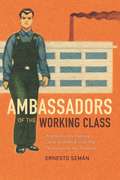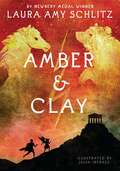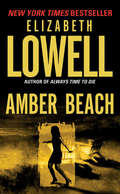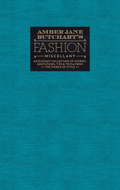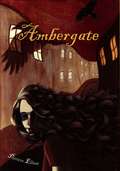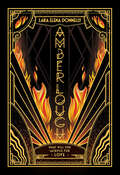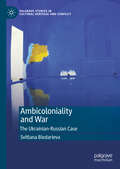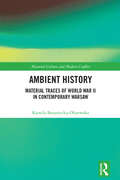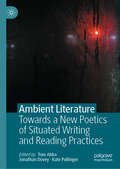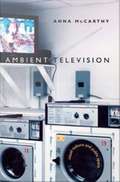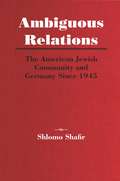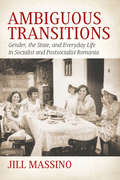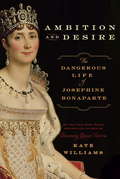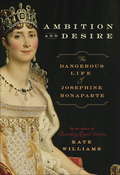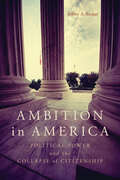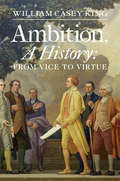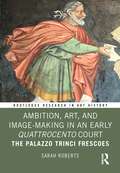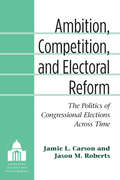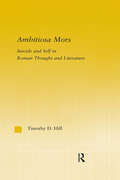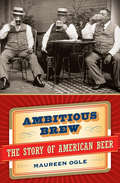- Table View
- List View
Ambassadors of the Working Class: Argentina's International Labor Activists and Cold War Democracy in the Americas
by Ernesto SemánIn 1946 Juan Perón launched a populist challenge to the United States, recruiting an army of labor activists to serve as worker attachés at every Argentine embassy. By 1955, over five hundred would serve, representing the largest presence of blue-collar workers in the foreign service of any country in history. A meatpacking union leader taught striking workers in Chicago about rising salaries under Perón. A railroad motorist joined the revolution in Bolivia. A baker showed Soviet workers the daily caloric intake of their Argentine counterparts. As Ambassadors of the Working Class shows, the attachés' struggle against US diplomats in Latin America turned the region into a Cold War battlefield for the hearts of the working classes. In this context, Ernesto Semán reveals, for example, how the attachés' brand of transnational populism offered Fidel Castro and Che Guevara their last chance at mass politics before their embrace of revolutionary violence. Fiercely opposed by Washington, the attachés’ project foundered, but not before US policymakers used their opposition to Peronism to rehearse arguments against the New Deal's legacies.
Ambedkar
by R. MuthukumarThis book is a biography of Bodhisatva Bhimrao Ramji Ambedkar also known as Babasaheb who was an Indian jurist, political leader, Buddhist activist, philosopher, thinker, anthropologist, historian, orator, prolific writer, economist, scholar, editor, revolutionary and a revivalist for Buddhism in India. He was also the Chairman of the Drafting Committee of Indian Constitution and was awarded the highest Indian civilian award "Bharat Ratna".
Amber & Clay
by Laura Amy SchlitzWelcome to ancient Greece as only genius storyteller Laura Amy Schlitz can conjure it. In a warlike land of wind and sunlight, “ringed by a restless sea,” live Rhaskos and Melisto, spiritual twins with little in common beyond the violent and mysterious forces that dictate their lives. A Thracian slave in a Greek household, Rhaskos is as common as clay, a stable boy worth less than a donkey, much less a horse. Wrenched from his mother at a tender age, he nurtures in secret, aided by Socrates, his passions for art and philosophy. Melisto is a spoiled aristocrat, a girl as precious as amber but willful and wild. She’ll marry and be tamed—the curse of all highborn girls—but risk her life for a season first to serve Artemis, goddess of the hunt. Bound by destiny, Melisto and Rhaskos—Amber and Clay—never meet in the flesh. By the time they do, one of them is a ghost. But the thin line between life and death is just one boundary their unlikely friendship crosses. It takes an army of snarky gods and fearsome goddesses, slaves and masters, mothers and philosophers to help shape their story into a gorgeously distilled, symphonic tour de force. Blending verse, prose, and illustrated archeological “artifacts,” this is a tale that vividly transcends time, an indelible reminder of the power of language to illuminate the over- and underworlds of human history.
Amber Beach
by Elizabeth LowellHonor Donovan is a shrewd businesswoman, yet she has been shut out of Donovan International by her father and four brothers. When her favorite brother Kyle vanishes, along with a fortune in stolen amber, Honor's questions are ignored by the Donovan males. Defying them, she heads to the San Juan Islands of the Pacific Northwest in search of answers.Honor needs a guide because she knows nothing about running a boat -- and she knows nothing about Jake Mallory until he answers her ad. One of the things she doesn't know is that Jake is much more than a fishing guide. Until Kyle disappeared, Jake was brokering amber deals in the Baltic for Donovan International. Honor is completely unaware of the old wars, new politics, greed, and stolen amber that have lured ruthless, high-stakes players from around the globe.Jake wants no part of the intrigue, or of a Donovan woman in his life, but he suspects the Donovans have set him up to take the fall for Kyle's treachery. The way Jake sees it, some Donovan is going to pay for his troubles, and it just may turn out to be HonorJake and Honor cast off on a journeys moldering with distrust, betrayal, vengeance... and temptation. A hunger grows between them that is as dangerous as the secrets they keep. Alone at sea, they pursue the stubborn mystery of the Amber Room, flee from relentless enemies, and fight against trusting each other. Yet when Honor and Jake dare to confide in one another, they face a final truth: the penalty for betrayal is death; the reward is a lifetime...together.
Amber Fire
by Elaine BarbieriAuburn-haired, and amber-eyed Melanie Morganfield had already lived in Asa Parker's mansion since she was a child. But with each passing day now, the kind family friend --29 years her senior--found it harder and harder to control his growing affection for the blossoming young woman. Asa was bewitched by Melanie's fresh beauty and saucy tongue and gave her everything he could give ... everything but marriage. Despite Melanie's devotion to respectable Asa Parker, she couldn't explain her reaction to Stephen Hull. Each time she saw the dark and sensual young man, Melanie's senses throbbed with a longing that seared her veins. She knew she must avoid meeting Stephen Hull ever again -- before she begged him to never let her go!
Amber Jane Butchart's Fashion Miscellany: An Elegant Collection of Stories, Quotations, Tips & Trivia from the World of Style
by Amber ButchartStyles come and and go, but fashion has an enduring appeal, a rich history, and an everyday practical relevance for millions.Launched to coincide with London Fashion Week 2014, this book offers a host of new perspectives on a classic subject. Professional fashion expert Amber Jane Butchart casts a quizzical eye over fashion's oddities, revealing the histories of such garments as the Adelaide boot, the origins of many technical terms and a host of entertaining quotes and aphorisms from the field's most colourful names.Specially-commissioned line illustrations from Penelope Beech complete the book, making it a feast for the eyes as well as treat for the stylish soul.
Amber Skies
by Leigh BristolFor Jessica, born into poverty and her father's cruelty, the offer of marriage from rich rancher Daniel Fielding seemed like a miracle. And when her father shot her fiance in cold blood on her wedding day and kidnapped her, it was more than a crime...it was the shattering of her dreams. Little did Jessica know that Daniel's rough and wild cowboy brother Jake was coming to rescue her, the same brother who believed her a scheming fortune hunter. Burning with vengeance, Jake Fielding rode hellbent for leather across the Western plains; only to burn with desire when he found her-his brother's betrothed, and his own destiny. Jessica had run from danger and death to bliss and betrayal. Now, in Jake's arms, the fire of each forbidden kiss could sweep her towards a lifetime of lies, a showdown of blood and tears-or an eternity of love.
Ambergate
by Patricia ElliottI am the girl with no name ... I have a secret I must never tell. If I do, they will come after me - the Protector and his men. Only a number branded on her arm betrays the orphan girl's past. When she arrives at Murkmere Hall to be a kitchen maid, they call her Scuff, and little guess she has committed a terrible crime. Haunted by her dark secret, all Scuff can do is pray to the divine beings - the birds - for forgiveness. Now, five years later, the past is catching up with Scuff. Hunted from all sides, she flees Murkmere, only to be forced back to the cruel confines of the Capital, and the Orphans' Home where it all began.
Amberlough: Book 1 In The Amberlough Dossier (Amberlough Dossier #1)
by Lara Elena DonnellyA double-agent sacrifices all his ideals in order to save his smuggler lover before a government coup takes over their decadent city in Lara Elena Donnelly’s glam spy thriller debut, a Nebula finalist for Best Novel!“Exploring the roots of hatred, nationalism, and fascism, while at the same time celebrating the diversity, love, romance, fashion, and joy the world is capable of producing.” —BookriotIntroducing…The Smuggler: By day, Aristide Makricosta is the emcee for Amberlough City’s top nightclub. By night, he moves drugs and refugees under the noses of crooked cops.The Spy: Covert agent Cyril DePaul thinks he’s good at keeping secrets, but after a disastrous mission abroad, he makes a dangerous choice to protect himself…and hopefully Aristide too.The Dancer: Streetwise Cordelia Lehane, burlesque performer at the Bumble Bee Cabaret and Aristide’s runner, could be the key to Cyril’s plans—if she can be trusted.As the twinkling marquees lights yield to the rising flames of a fascist revolution, these three will struggle to survive using whatever means — and people — necessary. Including each other.“James Bond by way of Oscar Wilde.” —Holly Black“Sparkling with slang, full of riotous characters, and dripping with intrigue, Amberlough is a dazzling romp through a tumultuous, ravishing world.” —Robert Jackson Bennett, winner of the Shirley Jackson Award and the Edgar Award“Astonishing first novel!” —World Fantasy Award-winning author Ellen KushnerAt the Publisher's request, this title is being sold without Digital Rights Management Software (DRM) applied.
Amberly, la esposa perfecta (Trilogía Hermanas Davenport #Volumen 1)
by Verónica MengualDescubre a las hermanas Davenport en esta trilogía. Tres hermanas que harán su «pequeña revolución» dentro de la época en la que les toca vivir. Esta es la historia de Amberly. ¿Será capaz de ser feliz con el odioso señor Kinsley? Hija de un conde sin herederos, lady Amberly Davenport toma la decisión de sacrificarse y entregarse en matrimonio a un rico abogado que lleva tras ella tres años. Ella no lo soporta y él está empecinado en que sea suya por completo, no sin antes darle un escarmiento. Atados finalmente el uno al otro, comienzan un matrimonio tortuoso que hará que Amberly huya despavorida. ¿Podrá él cumplir su cometido?
Ambicoloniality and War: The Ukrainian-Russian Case (Palgrave Studies in Cultural Heritage and Conflict)
by Svitlana BiedarievaThis book proposes a new notion of “ambicoloniality” to speak about the current situation when Ukraine has become Russia's territory of obsession, and Russia, in its desire to occupy Ukraine, has in effect subjected itself to Ukraine’s symbolic dominance. Ambicoloniality presents a key point of divergence from already existing models, as the mutual impact of the two countries over centuries has gone both ways, over a shared border — in contrast to other empires that established their colonial power relations at a distance. The Ukrainian-Russian case is very different from the examples covered by both postcolonial and decolonial theorists. To explore the reasons and consequences of such a differing process of colonial expansion/ anti-colonial struggle/ decolonial release, the book inquires into the historical and cultural reasons for the emerging gap between the two states. It explores which role cultural hybridity plays in political self-identification in both Ukraine and Russia, and how this hybridity has manifested in society and culture (including examples of art and literature) following the dissolution of the Soviet Union in 1991, until 2023.
Ambient History: Material Traces of World War II in Contemporary Warsaw (Material Culture and Modern Conflict)
by Kamila Baraniecka-OlszewskaAmbient History presents the role urban fabric plays in constructing the wartime history of Warsaw. It focuses on history embedded in matter and details the practices followed by municipal institutions, artists and historical reenactors who pull history out of the background through their actions.The book offers a new perspective on the material history of the city. It presents the concept of ambient history – history hidden in the background, in the landscape – waiting to be utilised by individuals coming into contact with the fabric of the city. It draws on anthropological considerations of history which embrace non-academic methods of conceptualising the past and processes of democratising history. The book has two principal objectives. One is to give theoretical grounding to the term ‘ambient history’, which facilitates the conceptualisation of material history and the role experiencing it plays in the process of constructing history. The other is to try and determine the limits of the heuristic potential of posthumanist reflection on materiality in reference to research focused on the making of history.Therefore, the book is valuable reading for researchers studying non-academic methods of curating history: scholars investigating materiality and things, anthropologists of history, scholars of heritage studies, experts in urban studies, historians focused on public history and archaeologists analysing the discipline’s theory.
Ambient Literature: Towards a New Poetics of Situated Writing and Reading Practices
by Kate Pullinger Tom Abba Jonathan DoveyThis book considers how a combination of place-based writing and location responsive technologies produce new kinds of literary experiences. Building on the work done in the Ambient Literature Project (2016–2018), this books argues that these encounters constitute new literary forms, in which the authored text lies at the heart of an embodied and mediated experience. The visual, sonic, social and historic resources of place become the elements of a live and emergent mise-en-scène. Specific techniques of narration, including hallucination, memory, history, place based writing, and drama, as well as reworking of traditional storytelling forms combine with the work of app and user experience design, interaction, software authoring, and GIS (geographical information systems) to produce ambient experiences where the user reads a textual and sonic literary space. These experiences are temporary, ambiguous, and unpredictable in their meaning but unlike the theatre, the gallery, or the cinema they take place in the everyday shared world. The book explores the potentiality of a new literary form produced by the exchange between location-aware cultural objects, writers and readers. This book, and the work it explores, lays the ground for a new poetics of situated writing and reading practices.
Ambient Television: Visual Culture and Public Space
by Anna MccarthyAlthough we tend to think of television primarily as a household fixture, TV monitors outside the home are widespread: in bars, laundromats, and stores; conveying flight arrival and departure times in airports; uniting crowds at sports events and allaying boredom in waiting rooms; and helping to pass the time in workplaces of all kinds. In Ambient Television Anna McCarthy explores the significance of this pervasive phenomenon, tracing the forms of conflict, commerce, and community that television generates outside the home. Discussing the roles television has played in different institutions from 1945 to the present day, McCarthy draws on a wide array of sources. These include retail merchandising literature, TV industry trade journals, and journalistic discussions of public viewing, as well as the work of cultural geographers, architectural theorists, media scholars, and anthropologists. She also uses photography as a research tool, documenting the uses and meanings of television sets in the built environment, and focuses on such locations as the tavern and the department store to show how television is used to support very different ideas about gender, class, and consumption. Turning to contemporary examples, McCarthy discusses practices such as Turner Private Networks' efforts to transform waiting room populations into advertising audiences and the use of point-of-sale video that influences brand visibility and consumer behavior. Finally, she inquires into the activist potential of out-of-home television through a discussion of the video practices of two contemporary artists in everyday public settings. Scholars and students of cultural, visual, urban, American, film, and television studies will be interested in this thought-provoking, interdisciplinary book.
Ambiguous Relations: The American Jewish Community and Germany Since 1945
by Shlomo ShafirThe reemergence of a united Germany as a dominant power in Europe has increased even more it's importance as a major political ally and trade partner of the United States, despite the misgivings of some U.S. citizens. Ambiguous Relations addresses for the first time the complex relationships between American Jews and Germany over the fifty years following the end of World War II, and examines American Jewry's' ambiguous attitude toward Germany that continues despite sociological and generational changes within the community. Shlomo Shafir recounts attempts by American Jews to influence U.S. policy toward Germany after the ware and traces these efforts through President Reagan's infamous visit to Bitburg and beyond. He shows how Jewish demands for justice were hampered not only by America's changing attitude toward West Germany as a postwar European power but also by the distraction of anti-communist hysteria in this country. In evaluating the impact of Jewish pressure on American public opinion and on the West German government, Shafir discusses the rationales and strategies of Jewish communal and religious groups, legislators, and intellectuals, as well as the rise of Holocaust consciousness and the roles of Israel and surviving German Jewish communities. He also describes the efforts of German diplomats to assuage American Jewish hostility and relates how the American Jewish community has been able to influence German soul-searching regarding their historical responsibility and even successfully intervened to bring war criminals to trial. Based on extensive archival research in Germany, Israel, and the Unities States, Ambiguous Relations in the first book to examine this tenuous situation in such depth. It is a comprehensive account of recent history that comes to groups with emotional and political reality.
Ambiguous Transitions: Gender, the State, and Everyday Life in Socialist and Postsocialist Romania
by Jill MassinoFocusing on youth, family, work, and consumption, Ambiguous Transitions analyzes the interplay between gender and citizenship postwar Romania. By juxtaposing official sources with oral histories and socialist policies with everyday practices, Jill Massino illuminates the gendered dimensions of socialist modernization and its complex effects on women’s roles, relationships, and identities. Analyzing women as subjects and agents, the book examines how they negotiated the challenges that arose as Romanian society modernized, even as it clung to traditional ideas about gender. Massino concludes by exploring the ambiguities of postsocialism, highlighting how the legacies of the past have shaped politics and women’s lived experiences since 1989.
Ambiguous Transitions: Gender, the State, and Everyday Life in Socialist and Postsocialist Romania
by Jill MassinoFocusing on youth, family, work, and consumption, Ambiguous Transitions analyzes the interplay between gender and citizenship postwar Romania. By juxtaposing official sources with oral histories and socialist policies with everyday practices, Jill Massino illuminates the gendered dimensions of socialist modernization and its complex effects on women’s roles, relationships, and identities. Analyzing women as subjects and agents, the book examines how they negotiated the challenges that arose as Romanian society modernized, even as it clung to traditional ideas about gender. Massino concludes by exploring the ambiguities of postsocialism, highlighting how the legacies of the past have shaped politics and women’s lived experiences since 1989.
Ambition and Desire
by Kate WilliamsFrom CNN's official royal historian, a highly praised young author with a doctorate from Oxford University, comes the extraordinary rags-to-riches story of the woman who conquered Napoleon's heart--and with it, an empire. Their love was legendary, their ambition flagrant and unashamed. Napoleon Bonaparte and his wife, Josephine, came to power during one of the most turbulent periods in the history of France. The story of the Corsican soldier's incredible rise has been well documented. Now, in this spellbinding, luminous account, Kate Williams draws back the curtain on the woman who beguiled him: her humble origins, her exorbitant appetites, and the tragic turn of events that led to her undoing. Born Marie-Josèphe-Rose de Tascher de La Pagerie on the Caribbean island of Martinique, the woman Napoleon would later call Josephine was the ultimate survivor. She endured a loveless marriage to a French aristocrat--executed during the Reign of Terror--then barely escaped the guillotine blade herself. Her near-death experience only fueled Josephine's ambition and heightened her determination to find a man who could finance and sustain her. Though no classic beauty, she quickly developed a reputation as one of the most desirable women on the continent. In 1795, she met Napoleon. The attraction was mutual, immediate, and intense. Theirs was an often-tumultuous union, roiled by their pursuit of other lovers but intensely focused on power and success. Josephine was Napoleon's perfect consort and the object of national fascination. Together they conquered Europe. Their extravagance was unprecedented, even by the standards of Versailles. But she could not produce an heir. Sexual obsession brought them together, but cold biological truth tore them apart. Gripping in its immediacy, captivating in its detail, Ambition and Desire is a true tale of desire, heartbreak, and revolutionary turmoil, engagingly written by one of England's most praised young historians. Kate Williams's searing portrait of this alluring and complex woman will finally elevate Josephine Bonaparte to the historical prominence she deserves.
Ambition and Desire
by Kate WilliamsFrom CNN's official royal historian, a highly praised young author with a doctorate from Oxford University, comes the extraordinary rags-to-riches story of the woman who conquered Napoleon's heart--and with it, an empire.Their love was legendary, their ambition flagrant and unashamed. Napoleon Bonaparte and his wife, Josephine, came to power during one of the most turbulent periods in the history of France. The story of the Corsican soldier's incredible rise has been well documented. Now, in this spellbinding, luminous account, Kate Williams draws back the curtain on the woman who beguiled him: her humble origins, her exorbitant appetites, and the tragic turn of events that led to her undoing.Born Marie-Josèphe-Rose de Tascher de La Pagerie on the Caribbean island of Martinique, the woman Napoleon would later call Josephine was the ultimate survivor. She endured a loveless marriage to a French aristocrat--executed during the Reign of Terror--then barely escaped the guillotine blade herself. Her near-death experience only fueled Josephine's ambition and heightened her determination to find a man who could finance and sustain her. Though no classic beauty, she quickly developed a reputation as one of the most desirable women on the continent.In 1795, she met Napoleon. The attraction was mutual, immediate, and intense. Theirs was an often-tumultuous union, roiled by their pursuit of other lovers but intensely focused on power and success. Josephine was Napoleon's perfect consort and the object of national fascination. Together they conquered Europe. Their extravagance was unprecedented, even by the standards of Versailles. But she could not produce an heir. Sexual obsession brought them together, but cold biological truth tore them apart.Gripping in its immediacy, captivating in its detail, Ambition and Desire is a true tale of desire, heartbreak, and revolutionary turmoil, engagingly written by one of England's most praised young historians. Kate Williams's searing portrait of this alluring and complex woman will finally elevate Josephine Bonaparte to the historical prominence she deserves.
Ambition in America: Political Power and the Collapse of Citizenship
by Jeffrey A. BeckerMost Americans admire the determination and drive of artists, athletes, and CEOs, but they seem to despise similar ambition in their elected officials. The structure of political representation and the separation of powers detailed in the United States Co
Ambition, A History: From Vice to Virtue
by William Casey KingIs &“ambitious&” a compliment? It depends: &“[A] masterpiece of intellectual and cultural history.&”—David Brion Davis, author of Inhuman Bondage: The Rise and Fall of Slavery in the New World From rags to riches, log house to White House, enslaved to liberator, ghetto to CEO, ambition fuels the American Dream. Yet at the time of the nation's founding, ambition was viewed as a dangerous vice, everything from &“a canker on the soul&” to the impetus for original sin. This engaging book explores ambition&’s surprising transformation, tracing attitudes from classical antiquity to early modern Europe to the New World and America&’s founding. From this broad historical perspective, William Casey King deepens our understanding of the American mythos and offers a striking reinterpretation of the introduction to the Declaration of Independence. Through an innovative array of sources and authors—Aquinas, Dante, Machiavelli, the Geneva Bible, Marlowe, Shakespeare, Thomas Jefferson, and many others—King demonstrates that a transformed view of ambition became possible the moment Europe realized that Columbus had discovered not a new route but a new world. In addition the author argues that reconstituting ambition as a virtue was a necessary precondition of the American republic. The book suggests that even in the twenty-first century, ambition has never fully lost its ties to vice and continues to exhibit a dual nature—positive or negative depending upon the ends, the means, and the individual involved.
Ambition, Art, and Image-Making in an Early Quattrocento Court: The Palazzo Trinci Frescoes (Routledge Research in Art History)
by Sarah RobertsThis study provides new interpretations of the little-known but fascinating Palazzo Trinci frescoes, relating them for the first time both to their physical context and to their social, political, and cultural environment.Chapters show how a humanist agenda subverted the historical and mythical associations more frequently used to promote powerful families, to point the Trinci family in new directions. It also shows how the artists involved adapted established civic, religious, and chivalric imagery in support of these ideas. The book argues that the resulting decorations are highly unusual for the period, in their serious political and social purpose. Positioning the Trinci as bringers of peace, not war, the family is now associated with culture and education and presented as willing to encourage debate about the character of the virtuous ruler and the nature of good government.The book will be of interest to scholars working in art history and Renaissance studies.
Ambition, Competition, and Electoral Reform: The Politics of Congressional Elections Across Time
by Jamie L. Carson Jason Matthew RobertsIn Ambition, Competition, and Electoral Reform, Jamie L. Carson and Jason M. Roberts present an original study of U.S. congressional elections and electoral institutions for 1872-1944 from a contemporary political science perspective. Using data on late nineteenth and early twentieth century congressional elections, the authors test the applicability in a historical context of modern political science theories, assess the effects of institutional reforms, and identify the factors that shape the competitiveness of elections. They present several key findings: the strategic politicians theory is applicable in an era without candidate-centered campaigns; there was an incumbency advantage prior to the full development of candidate-centered campaigns; institutional reforms have had a significant effect on elections; and the degree of electoral competition frequently correlates with elected officials' responsiveness to citizens.
Ambitiosa Mors: Suicide and the Self in Roman Thought and Literature (Studies in Classics)
by T. D. HillFirst Published in 2004. Routledge is an imprint of Taylor & Francis, an informa company.
Ambitious Brew
by Maureen OgleAmbitious Brew, the first-ever history of American beer, tells an epic story of American ingenuity and the beverage that became a national standard. Not always America’s drink of choice, beer finally took its top spot in the nation’s glasses when a wave of German immigrants arrived in the mid-nineteenth century and settled in to re-create the beloved biergartens they had left behind. Fifty years later, the American-style lager beer they invented was the nation’s most popular beverage-and brewing was the nation’s fifth-largest industry, ruled over by titans Frederick Pabst and Adolphus Busch. Anti-German sentiments aroused by World War I fed the flames of the temperance movement and brought on Prohibition. After its repeal, brewers replaced flavor with innovations such as flashy marketing and lite beer, setting the stage for the generation of microbrewers whose ambitions would reshape the brew once again. Grab a glass and a stool as Maureen Ogle pours out the surprising story behind your favorite pint.
